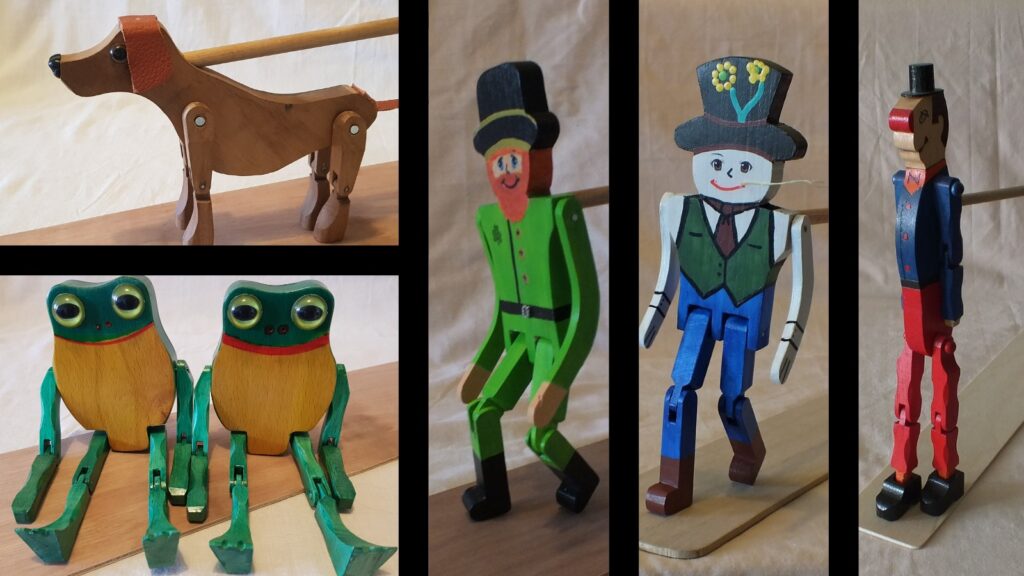By Martin Judkins
Background
The Dutch working group Jigdolls & Limberjacks operates under the umbrella of St. Samen Voor Elkaar, a non-profit foundation that strives to bring folk traditions back into the public eye and make them accessible to all folk. The foundation also runs a Folk Club, “Rocking Good Folk†that organises folk concerts in the North of the Netherlands, concentrating on English, Scottish and Irish folk, both traditional and contemporary.
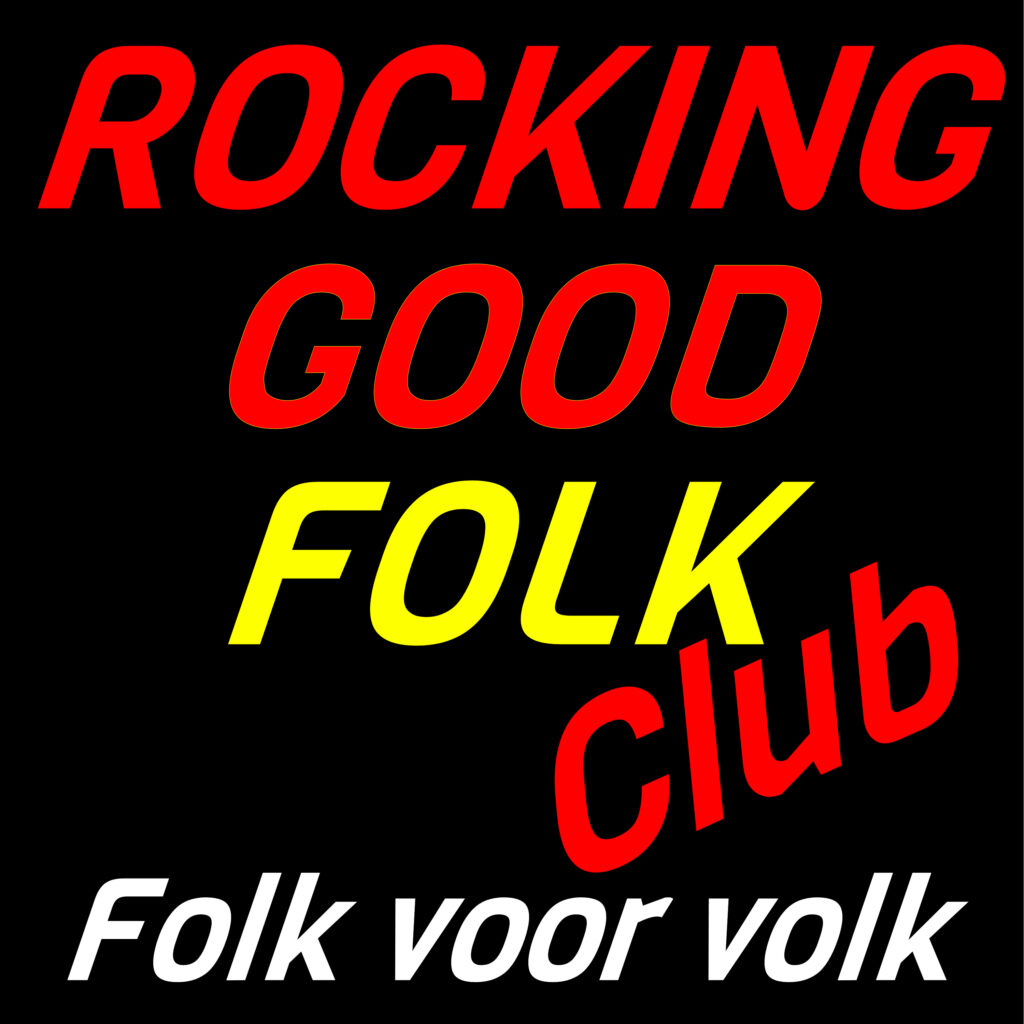
The chairman of the foundation is Martin Judkins, a Brit, now retired, who has spent the last 40+ years of his life in The Netherlands, who is still very much involved in the British and Irish folk world, having organised many concerts and festivals in The Netherlands over the decades. He played in various folk bands and is present at a great many folk sessions all over the country with his fiddle, harmonica and spoons.
Jig Dolls
In July of 2019, Martin was browsing the various corners of the internet and he stumbled across something on the very informative website of Chris Brady that he vaguely remembered from his younger years in the UK; Jig Dolls. He started reading up on them and contacted various people to find out more. As his interest grew, so did his contacts, and he obtained various books, including Pat Pickles’ and Rennie Pickles first edition of Jig Dolls “The Brightest of Entertainers” and also Pat Pickles and Katie Howson’s second version, and Rodney Frost’s Mad Toys & Mechanical Marvels. Pat Pickles and Rennie Pickles’ book contained a handwritten letter from Pat to Goff Evans from October 2000, which is a wonderful part of Jig Doll history.
By a stroke of luck he was also able to lay his hands on an original Jolly Boy, dated around 1910, which includes the original stick and board. Although the box is lost, board and stick are still in fine condition. This triggered his interest in making these dolls himself and he joined various groups on Facebook dedicated to Jig Dolls and the making of Jig Dolls.
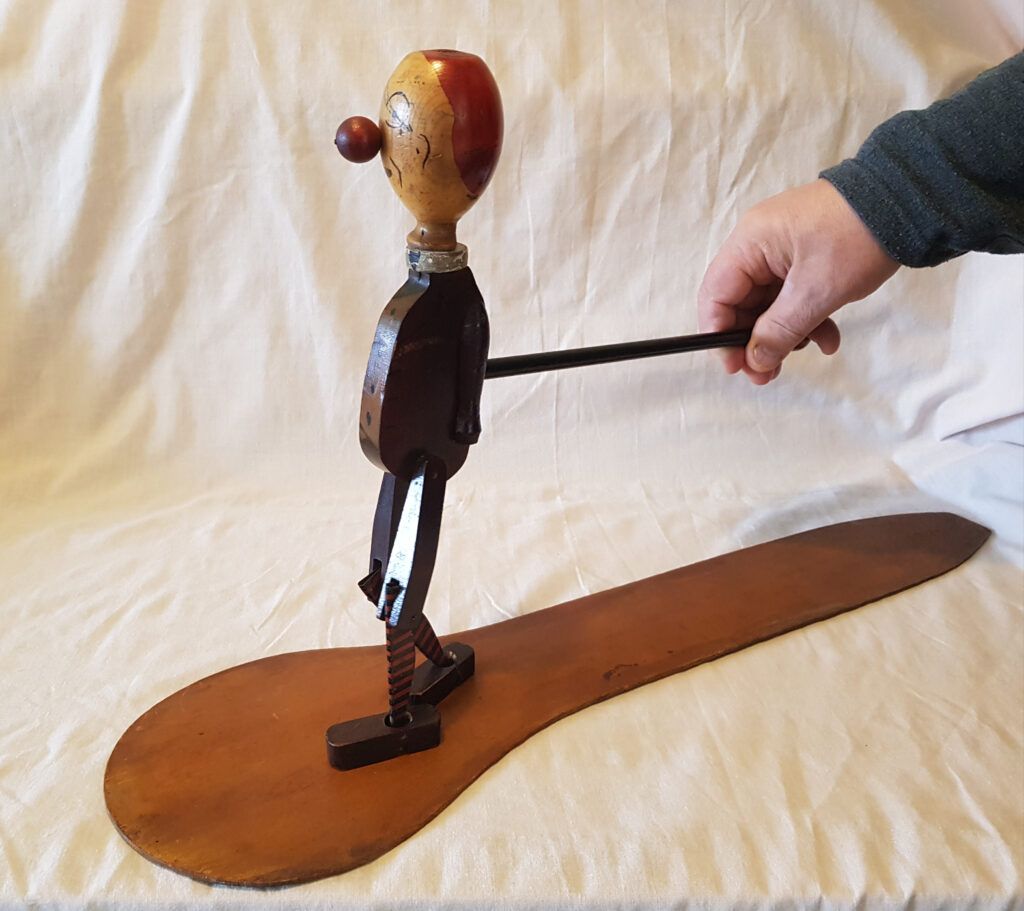
Mr Jolly Boy & Martin 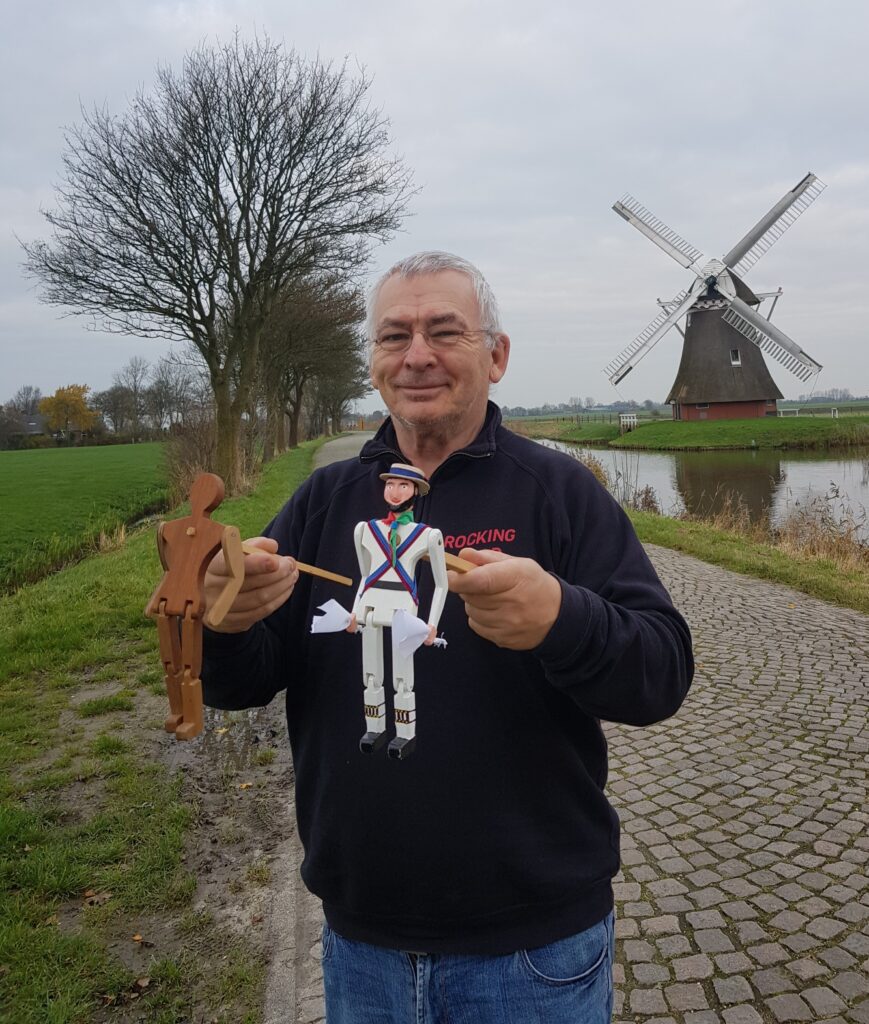
Martin with Bernie’s dolls
Talking to the world
One of his first contacts was John Foxen, and through him he became aware of the late Bernie Pilgrim’s Jig Dolls, and he was lucky enough to be able to purchase some of Bernie’s dolls as well.
During his many conversations he also came into contact with the family of the late Goff Evans, a well-known maker, and at the start of last year (2020) the foundation received from his family his entire remaining collection of materials, designs, templates and instructions. The family was looking for someone who wanted to learn to make them and over the last year Martin taught himself how to use various woodworking tools and how to craft them, all based on Goff Evans’ meticulously kept records, while also learning to design new models and accessories.
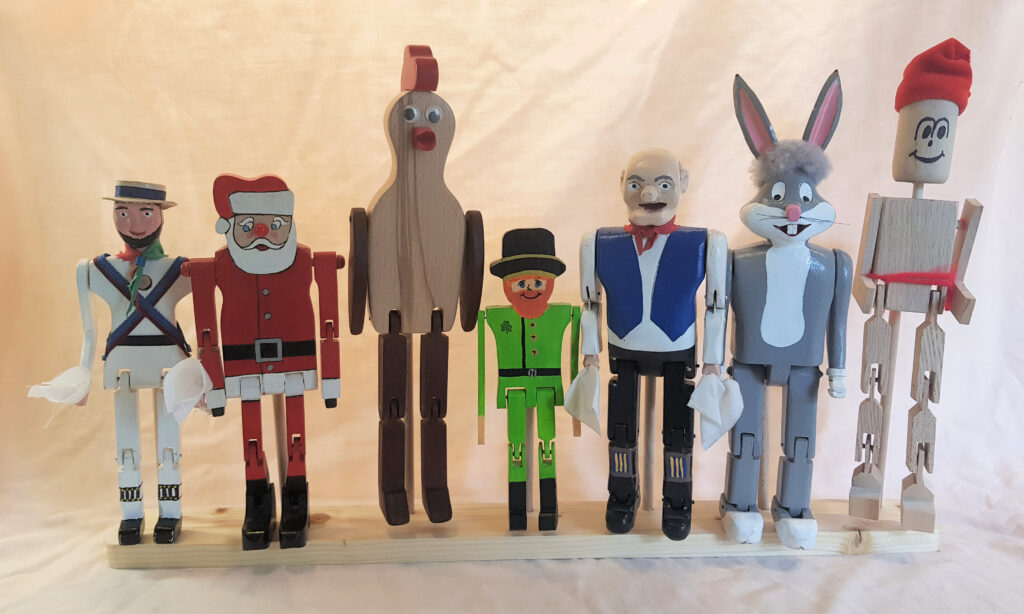
Lately the contacts have been expanded, to even include Quebec (where they are of course known as Gigueur or Limberjacks), as well as Japan, where they are gaining in popularity and a few makers are bringing their own interpretation of this wonderful folk art.
We also contacted Alex Bartholomew of the East Anglian Traditional Music Trust (EATMT) as we found many of the goals and purposes of the EATMT run parallel to our own, and we are happy to be in warm contact and even to learn from the established activities of the EATMT! This led to the idea of introducing ourselves and our activities via the EATMT newsletter, and to share our plans with you!
Tradition
The tradition of Jig Dolls is a long one, thought to originate in Italy, historically practiced all over Europe and much to Martin’s delight there was historic evidence of Jig Dolls being used in The Netherlands. As they are virtually unknown here now, he decided that this was the perfect time to reintroduce this form of folk art to The Netherlands.
Martin does the woodworking part, Corine Nugteren, another volunteer, does the painting and dressing part and together they are creating these dolls, to take on the road, reintroducing the fun of making and dancing the dolls, and demonstrating them to anyone that wants to learn.
With a small group of volunteers, all of whom are folk musicians who have also gone through a learning curve, we plan to be teaching workshops, both on how to make them and how to dance them and we will be showing them off at sessions and concerts. We will take them to festivals, and into schools and retirement homes, once the world is back to a more normal state of being.
We are of course, as everyone else is, waiting until the restrictions brought on by Covid-19 are lifted so that gatherings are once again possible.
Once that is the case, we will hopefully be able to delight people with the dolls we are making and dancing, and reintroduce this lost folk art to The Netherlands, where they passed out of common folk knowledge at some point in the last 100 years, even though they were a staple at fairs and folk entertainment before that.
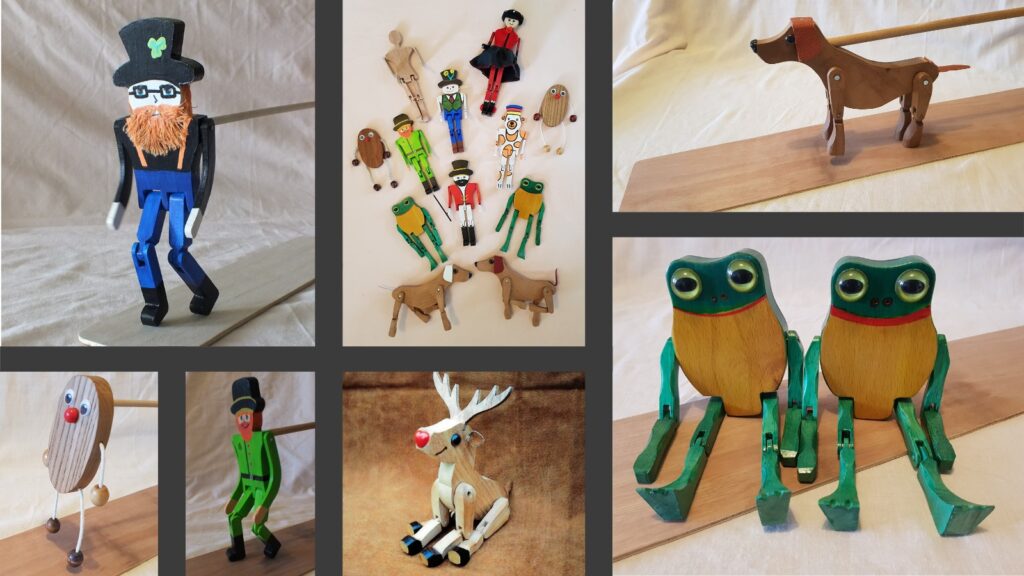
We are planning a “Jig Doll Library†service where people can borrow a Jig Doll, with instructions and a sample of music, to learn to dance the doll, they can take the doll home, practice and once they’ve decided this is for them, they can buy or make their own doll. Jig Dolls from the Jig Doll Library will also be taken out on the road and danced in demonstrations at festivals, fairs and anywhere we are invited.
To this end we have gathered a small collection of Jig Dolls from various sources, although not being in the UK does make it a bit harder to find jig dolls of any sort. As you can imagine, for our Jig Doll Library service and Jig Doll Demonstration collection we are always open to help with sourcing dolls, donations of dolls, accessories, books, leaflets and anything Jig Doll related to expand our pool of dolls and information for the public here in The Netherlands, Belgium and wider mainland Europe, so if you feel you can help in any way, please get in touch.
We offer some of the dolls we make ourselves for sale to the public to help fund our activities and travel, as well as cover some of the cost of the materials.
We have an Instagram account where we lift up a little bit of the veil and show our work as we go along, as well as a Facebook page. We have also set up a website to share information on the history, news, photos, videos, instructions on how to dance them, and a small online shop! All of our social media and website is in English, with a view to ensuring a Europe-wide audience can understand, but we produce flyers and instructions in the local language as well, so that as many people as possible can take part.
So come join us on: https://www.facebook.com/JigdollsLimberjacks and https://www.instagram.com/jigdolls_limberjacks/ and on our website http://www.jigdoll.com (already overflowing with great information, but also still expanding and enhancing!).
We owe a debt of gratitude to the many people who put in the research and time to expand our knowledge and the contacts that we made over the last year or so, as it really has been an amazing learning experience.
We look forward to many great experiences as the world opens up a little more, and hope at some point in the future we will be able to make it, with some of our Jig Dolls, to an EATMT event!
In the mean time, feel free to get in touch with us, for a chat, or with ideas, information, suggestions or help, we’re always happy to be in contact! You can reach us on info@jigdoll.com, or through the information form on our website.
June 2021
